The Chilean Army has declared another curfew as it struggles to contain violence that was triggered by transport fare hikes in Santiago, but has since spilled over beyond the capital, fueled by outrage over social inequality.
To prevent looting and arson attacks, thousands of armed troops have been patrolling the capital over the weekend, under the state of emergency introduced in Chile for the first time since the military dictatorship of Augusto Pinochet. Following another day of clashes with protesters, the general in charge of security in Santiago announced an extension of the curfew until 6am on Monday morning.
“This is not an action against the citizens, these are not restrictions for the sake of restrictions,” said General Javier Iturriaga del Campo.
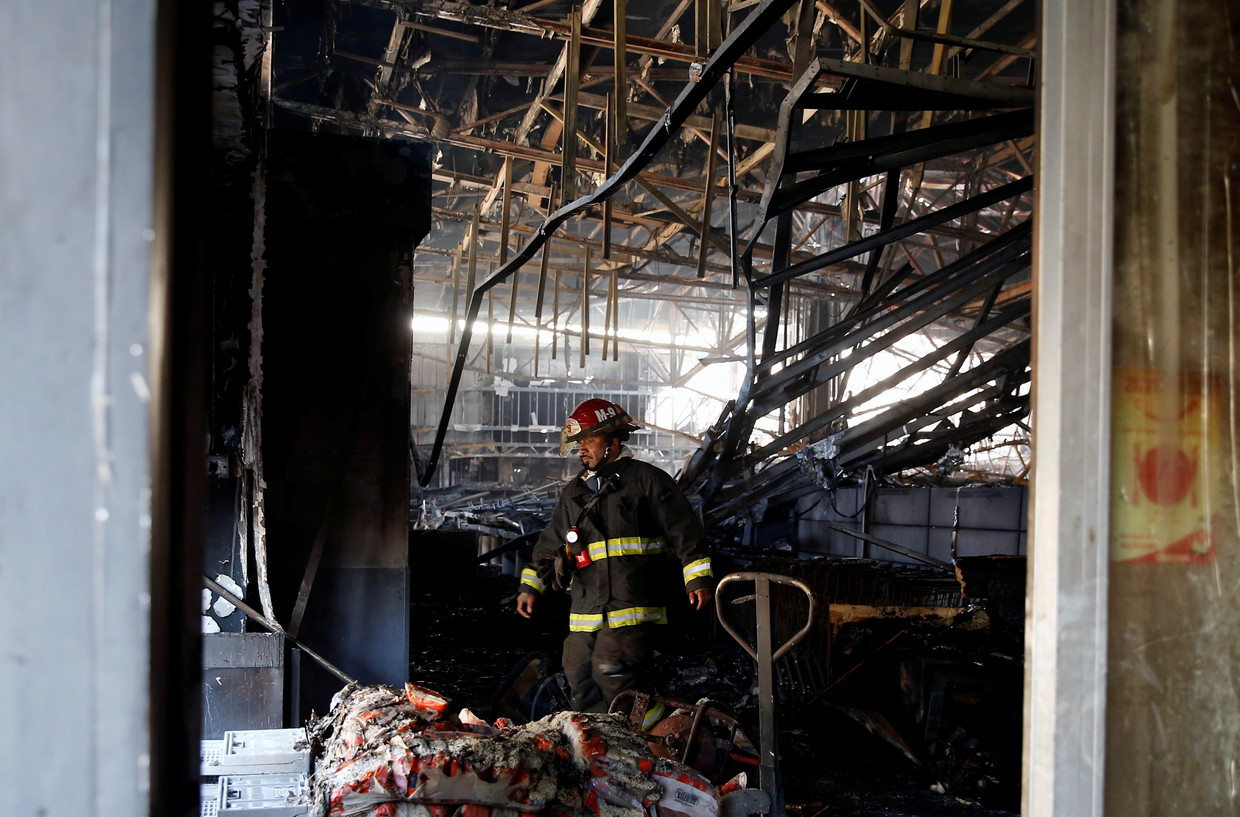
A firefighter is seen inside a burnt and looted supermarket in Valparaiso, Chile October 20, 2019 © Reuters / Rodrigo Garrido
Meanwhile, the death toll from the unrest increased to at least eight, after firefighters found five more bodies in the basement of a burnt-out warehouse. Earlier, three people were reported killed in two separate looting and arson attacks on supermarkets.
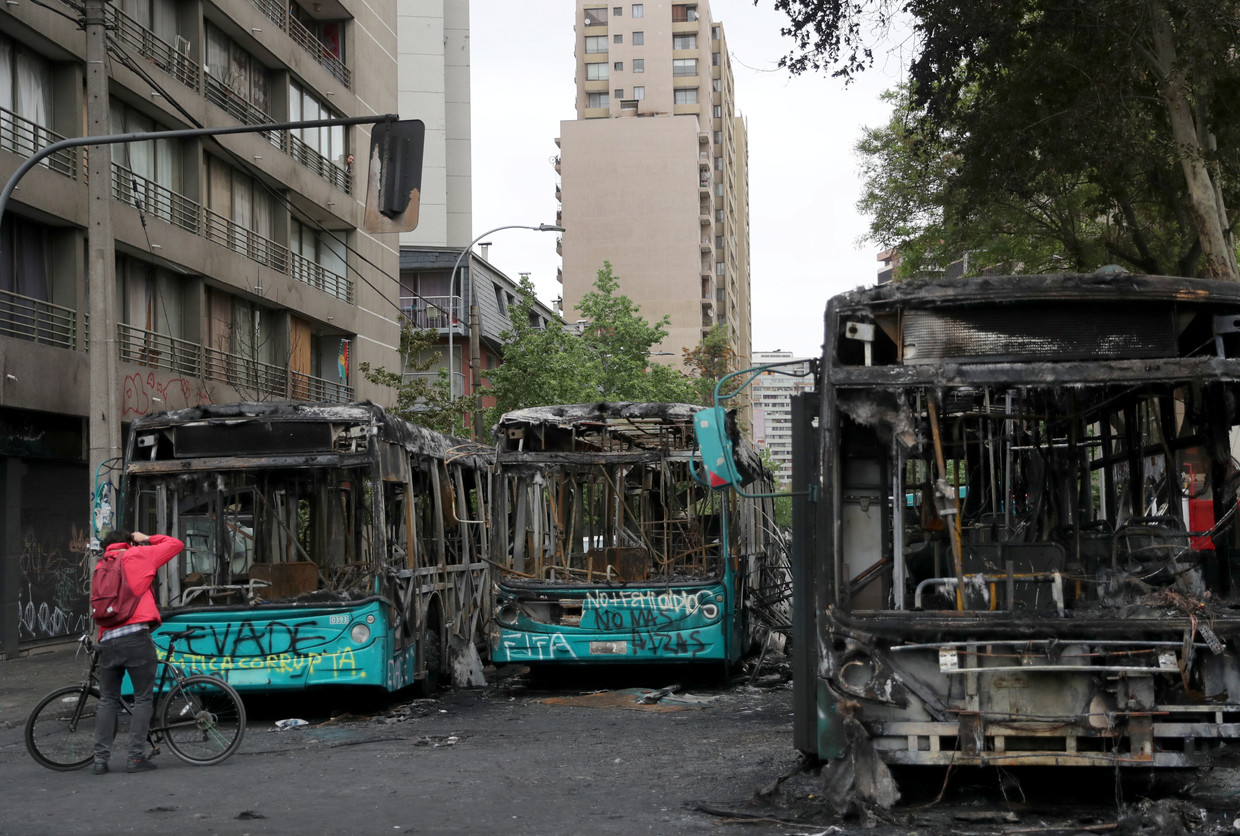
A man takes photos of burned buses, which were destroyed duirng a previous day's protest against the increase in subway ticket prices in Santiago, Chile, October 20, 2019. © Reuters / Ivan Alvarado
In a late-night televised statement from an army HQ in Santiago, President Sebastian Pinera said that the unrest had “a degree of organization, logistics, typical of a criminal organization” and urged Chileans to “unite in this battle against violence and delinquency.”
We are at war against a powerful enemy, who is willing to use violence without any limits.
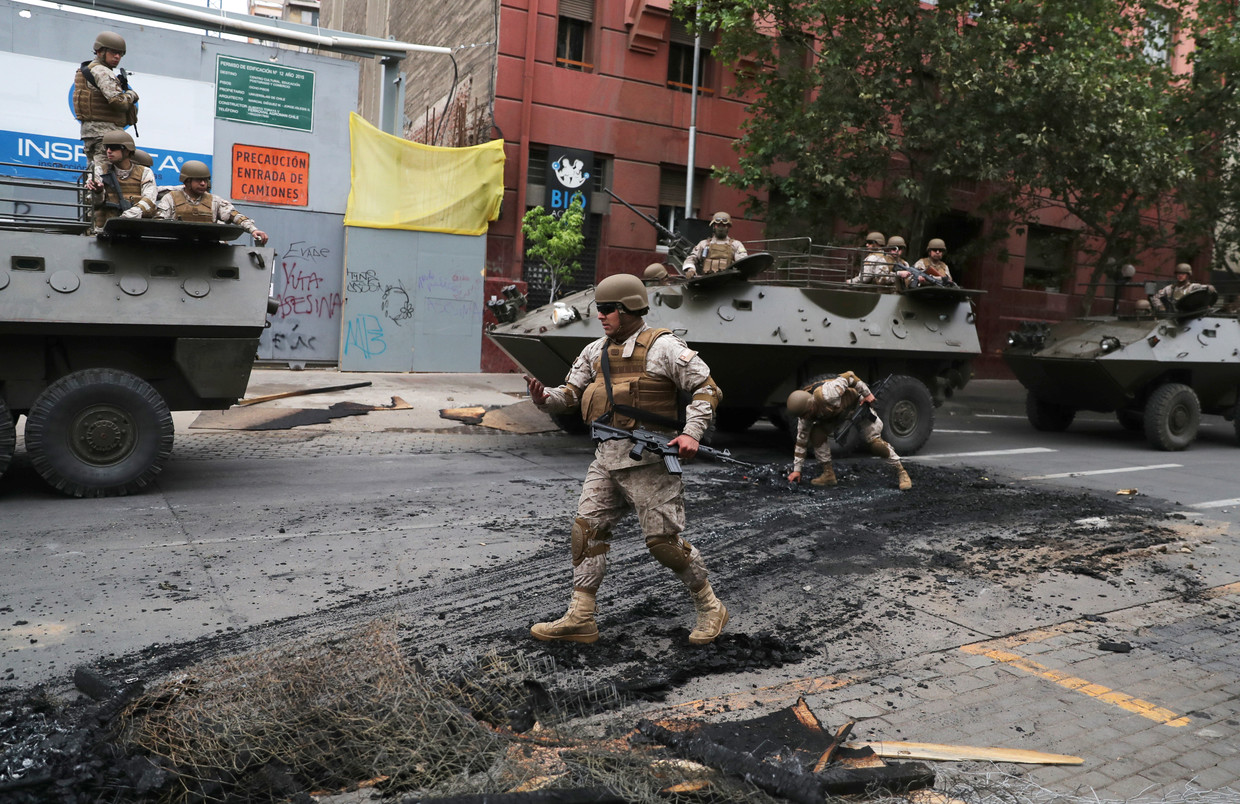
Soldiers patrol a street after a previous day's protest against the increase in subway ticket prices in Santiago, Chile, October 20, 2019 © Reuters / Ivan Alvarado
Crowds of angry protesters have been setting fire to buses and metro stations, as well as looting shops and destroying public property, since Friday. Authorities reported over 100 “serious incidents” in which nearly 1,500 people were arrested across the country by Sunday, including 614 in Santiago alone.
In a bid to defuse the crisis, Pinera hastily reversed the contentious transport fare hike, but it was not enough, as a wider public discontent over the government’s economic policies and growing social inequality seems to have reached its tipping point.
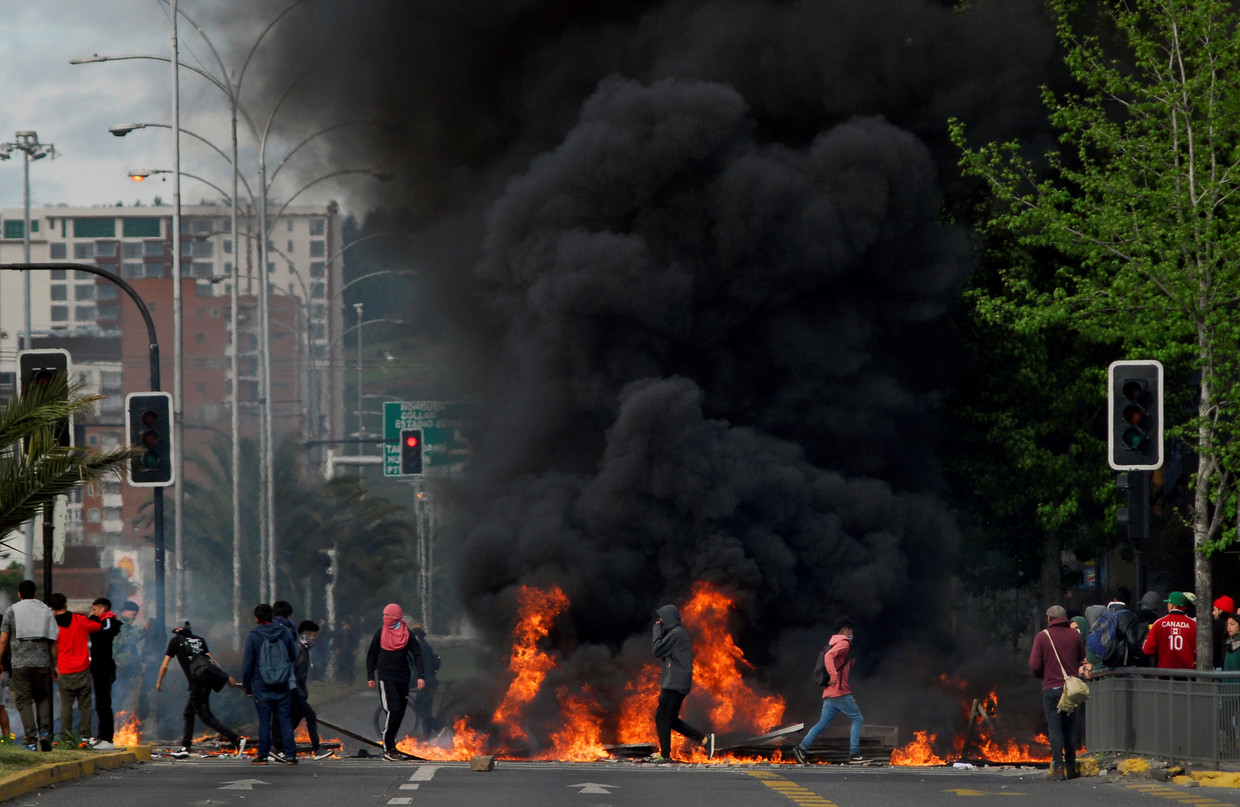
Demonstrators stand next to a burning barricade in Concepcion, Chile, October 20, 2019 © Reuters / Jose Luis Saavedra
Chile is facing it worst unrest in decades amid its year-long hosting of Asia-Pacific Economic Cooperation gatherings, and just as Santiago prepares to greet Russian President Vladimir Putin, US President Donald Trump and other world leaders next month.
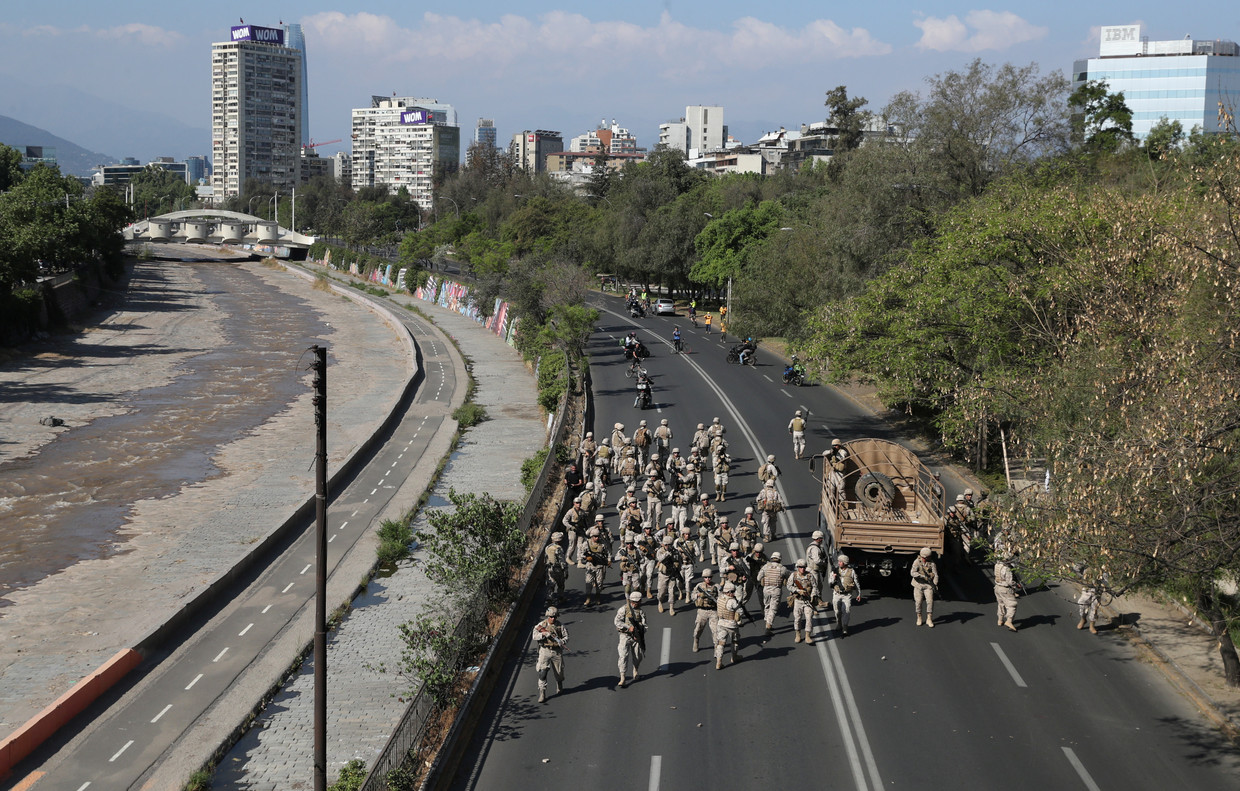
Soldiers march during a protest against Chile's state economic model in Santiago, Chile, October 20, 2019 © Reuters / Ivan Alvarado
To prevent looting and arson attacks, thousands of armed troops have been patrolling the capital over the weekend, under the state of emergency introduced in Chile for the first time since the military dictatorship of Augusto Pinochet. Following another day of clashes with protesters, the general in charge of security in Santiago announced an extension of the curfew until 6am on Monday morning.
“This is not an action against the citizens, these are not restrictions for the sake of restrictions,” said General Javier Iturriaga del Campo.
A firefighter is seen inside a burnt and looted supermarket in Valparaiso, Chile October 20, 2019 © Reuters / Rodrigo Garrido
Meanwhile, the death toll from the unrest increased to at least eight, after firefighters found five more bodies in the basement of a burnt-out warehouse. Earlier, three people were reported killed in two separate looting and arson attacks on supermarkets.
A man takes photos of burned buses, which were destroyed duirng a previous day's protest against the increase in subway ticket prices in Santiago, Chile, October 20, 2019. © Reuters / Ivan Alvarado
In a late-night televised statement from an army HQ in Santiago, President Sebastian Pinera said that the unrest had “a degree of organization, logistics, typical of a criminal organization” and urged Chileans to “unite in this battle against violence and delinquency.”
We are at war against a powerful enemy, who is willing to use violence without any limits.
Soldiers patrol a street after a previous day's protest against the increase in subway ticket prices in Santiago, Chile, October 20, 2019 © Reuters / Ivan Alvarado
Crowds of angry protesters have been setting fire to buses and metro stations, as well as looting shops and destroying public property, since Friday. Authorities reported over 100 “serious incidents” in which nearly 1,500 people were arrested across the country by Sunday, including 614 in Santiago alone.
In a bid to defuse the crisis, Pinera hastily reversed the contentious transport fare hike, but it was not enough, as a wider public discontent over the government’s economic policies and growing social inequality seems to have reached its tipping point.
Demonstrators stand next to a burning barricade in Concepcion, Chile, October 20, 2019 © Reuters / Jose Luis Saavedra
Chile is facing it worst unrest in decades amid its year-long hosting of Asia-Pacific Economic Cooperation gatherings, and just as Santiago prepares to greet Russian President Vladimir Putin, US President Donald Trump and other world leaders next month.
Soldiers march during a protest against Chile's state economic model in Santiago, Chile, October 20, 2019 © Reuters / Ivan Alvarado
RT



0 comentarios:
Publicar un comentario